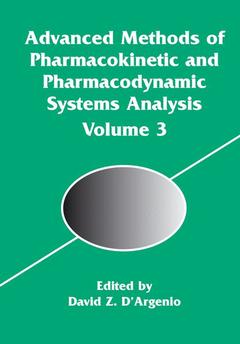Description
Advanced Methods of Pharmacokinetic and Pharmacodynamic Systems Analysis, Softcover reprint of the original 1st ed. 2004
The Springer International Series in Engineering and Computer Science Series, Vol. 765
Coordinator: D'Argenio David
Language: English
Subjects for Advanced Methods of Pharmacokinetic and Pharmacodynamic...:
Advanced Methods of Pharmacokinetic and Pharmacodynamic Systems Analysis
Publication date: 04-2013
318 p. · 15.5x23.5 cm · Paperback
Publication date: 04-2013
318 p. · 15.5x23.5 cm · Paperback
Advanced Methods of Pharmacokinetic and Pharmacodynamic Systems Analysis: Vol 3 (International Series in Engineering and Computer Science)
Publication date: 03-2004
318 p. · 15.5x23.5 cm · Hardback
Publication date: 03-2004
318 p. · 15.5x23.5 cm · Hardback
Description
/li>Contents
/li>
Advanced Methods of Pharmacokinetic and Pharmocodynamic SystemsAnalysis Volume 3 is vital to professionals and academicians working in drug development and bioengineering. Both basic and clinical scientists will benefit from this work.
This book contains chapters by leading researchers in pharmacokinetic/pharmacodynamic modeling and will be of interest to anyone involved with the application of pharmacokinetic and pharmacodynamics to drug development.
The use of mathematical modeling and associated computational methods is central to the study of the absorption, distribution and elimination of therapeutic drugs (pharmacokinetics) and to understanding how drugs produce their effects (pharmacodynamics). From its inception, the field of pharmacokinetics and pharmacodynamics has incorporated methods of mathematical modeling, simulation and computation in an effort to better understand and quantify the processes of uptake, disposition and action of therapeutic drugs. These methods for pharmacokinetic/pharmacodynamic systems analysis impact all aspects of drug development. In vitro, animal and human testing, as well as drug therapy are all influenced by these methods. Modeling methodologies developed for studying pharmacokinetic/ pharmacodynamic processes confront many challenges. This is related in part to the severe restrictions on the number and type of measurements that are available from laboratory experiments and clinical trials, as well as the variability in the experiments and the uncertainty associated with the processes themselves.
The contributions are organized in three main areas: Mechanism-Based PK/PD, Pharmacometrics and Pharmacotherapy. Both professionals and academics will profit from this extensive work.
This book contains chapters by leading researchers in pharmacokinetic/pharmacodynamic modeling and will be of interest to anyone involved with the application of pharmacokinetic and pharmacodynamics to drug development.
The use of mathematical modeling and associated computational methods is central to the study of the absorption, distribution and elimination of therapeutic drugs (pharmacokinetics) and to understanding how drugs produce their effects (pharmacodynamics). From its inception, the field of pharmacokinetics and pharmacodynamics has incorporated methods of mathematical modeling, simulation and computation in an effort to better understand and quantify the processes of uptake, disposition and action of therapeutic drugs. These methods for pharmacokinetic/pharmacodynamic systems analysis impact all aspects of drug development. In vitro, animal and human testing, as well as drug therapy are all influenced by these methods. Modeling methodologies developed for studying pharmacokinetic/ pharmacodynamic processes confront many challenges. This is related in part to the severe restrictions on the number and type of measurements that are available from laboratory experiments and clinical trials, as well as the variability in the experiments and the uncertainty associated with the processes themselves.
The contributions are organized in three main areas: Mechanism-Based PK/PD, Pharmacometrics and Pharmacotherapy. Both professionals and academics will profit from this extensive work.
Mechanism-Based PK/PD.- Physiological Modeling of the Small Intestine in Drug Absorption.- Intracellular Metabolism of Lamivudine.- Mechanism-Based Pharmacodynamic Modeling for Prediction of Exposure Response.- Mechanism-Based PK/PD Modeling of Digoxin: Role of Receptor Heterogeneity and Postrecepotor Events.- Pharmacodynamics and Pharmacogenomics of Corticosteroids: Microarray Studies.- Bayesian Inference in Physiologically-based Pharmacokinetic Modeling: Application to Aniticancer Drug Development.- Pharmacometrics.- Monte Carlo Parametric Expectation Maximization (MC-PEM) Method for Analyzing Population Pharmacokinetic/Pharmacodynamic Data.- Applications of Markov Chain Monte Carlo Methods to Inverse Problems in PK/PD.- Regenerative Markov Chain Monte Carlo Methods for Pharmacokinetic/Pharmacodynamic Estimation.- Vizstruct: A Multidimensional Visualization Algorithm for Gene Expression.- Pharmacotherapy.- Modeling and Simulation of Effects of Adherence, Pharmacokinetic, and Pharmacodynamic Characteristics in Development of Resistance to HIV Regimens in Treatment-Naive Patients.- Mechanistic PK/PD Modeling of Antiretroviral Therapies in AIDS Clinical Trials.- Dose Individualization for High-dose anti-cancer Chemotherapy.- Toward Model-Based Chemotherapy Treatment Design.- Control of Uncertain Pharmacodynamic Systems.
© 2024 LAVOISIER S.A.S.




